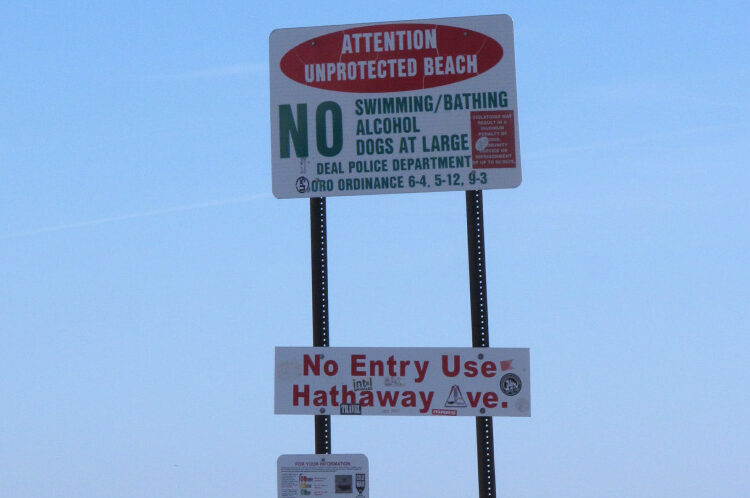DEAL, N.J. — It was hard to tell what had Matt Schwartz more stoked: the waves rolling in, or the relatively balmy 64-degree February weather as he wrapped up a day of surfing.
But something else was bothering him: the possibility that he won’t be able to surf here for much longer.
The spot where Schwartz carried his board ashore is the latest flash point in a decades-long battle in New Jersey and elsewhere over who can reach and use the beach.
The American Littoral Society is suing the borough of Deal, trying to nullify an ordinance it passed in December that would vacate the end of an oceanfront street in return for a $1 million payment from a nearby landowner who wants the property as part of a development proposal.
The group, which has fought for decades to preserve the public’s right to access and use public beaches, fears a dangerous precedent may be set in which coastal towns sell street ends to private landowners.
The new owners might then block off spots the public has long used to reach the sand, according to access advocates.
“It’s definitely not fair what they’re doing,” Schwartz said as he peeled off his wet suit and put his surfboard away.
“It seems like they cater to one class of wealthy people here. I own a business and I pay taxes, and I should be able to walk on a public beach.”
Deal says no physical barrier will prevent people from walking out onto the rocks and the sand even after the street end is vacated.
But surfers and fishermen are worried that is exactly what will happen once the transfer goes through.
“In the 1850s, our courts recognized the value of street ends in providing the public access to the shore,” said Andrew Provence, the lawyer for the Littoral Society. “It is important to fight this new notion that street ends … can be vacated for the right price.”
In Maine, a similar battle is playing out over an undeveloped stretch of road with waterfront access rights in Cape Elizabeth.
Residents who live near Surf Side Avenue have sued the town in hopes of preventing it from ever building a public path on the so-called “paper street.” They offered to pay $500,000 for the town to vacate its rights to the land, but the Town Council rejected it.
New Jersey’s law regarding beach access is based on legal principles dating back to the Roman Empire, in which the tidal waters and beaches are held in trust for the public.
The American Littoral Society says the street, Neptune Avenue, has long been used by surfers, fishermen and others.
“Public access to the beaches and tidal waterfronts of our state is constantly under attack,” said Tim Dillingham, the group’s executive director. “We are taking this action to prevent the loss of this important public access way to the beach, and to ensure that other towns aren’t tempted to sell off the public’s rights to the highest bidder.”
Deal counters that the end of Neptune Avenue has never been an official beach access point.
Send questions/comments to the editors.



Success. Please wait for the page to reload. If the page does not reload within 5 seconds, please refresh the page.
Enter your email and password to access comments.
Hi, to comment on stories you must . This profile is in addition to your subscription and website login.
Already have a commenting profile? .
Invalid username/password.
Please check your email to confirm and complete your registration.
Only subscribers are eligible to post comments. Please subscribe or login first for digital access. Here’s why.
Use the form below to reset your password. When you've submitted your account email, we will send an email with a reset code.